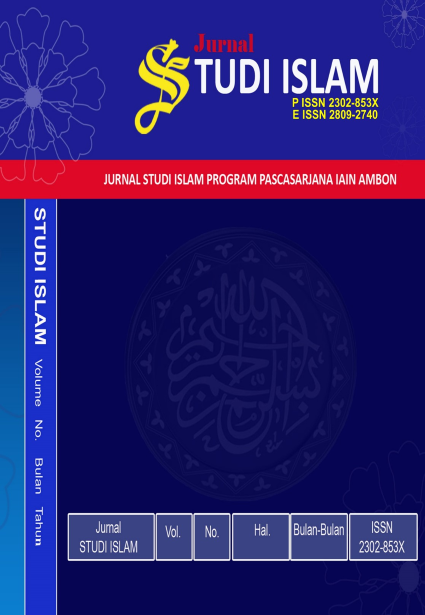CHILDFREE PERSPEKTIF TAFSIR AL-MISHBAH: ANALISIS QS. Al-NAHL(16) AYAT 72
DOI:
https://doi.org/10.33477/jsi.v12i1.5260Keywords:
childfree, Tafsir al-Mishbah, al-NahlAbstract
The purpose of this study is to analyze how the concept of childfree is viewed from the approach to the interpretation of the Qur'an in Surat al-Nahl (16) in verse 72 in the interpretation of al-Mishbah. This research is a literature review (literature research). Research with literature review is research that uses library materials as the main data source. In this research, the main data sources are l-Mishbah commentary and articles related to the concept of childfree. Based on the results of the research and discussion, it can be concluded that the concept of childfree is a phenomenon that is very contradictory and not in accordance with the teachings of Islam where economic factors are the reason for being childfree with the assumption that they are unable to fulfill the child's material rights later, or fears of losing a job or disrupting a career that has been built, then things This is very contrary to the motivation of the existing content in QS. al-Nahl: 72 according to the perspective of M. Quraish Shihab, in Tafsir Al Mishbah, that is, Allah made for you wives who are of the same kind as you so that you can get peace of life (Sakinah) from them. And from these wives Allah made for you children and grandchildren.References
Ar-Rasyid, Yanuriansyah. dkk. Refleksi Hukum Islam Terhadap Fenomena Childfree Perspektif Maslahah Mursalah. Syaksia: Jurnal Hukum Keluarga Islam, Vol. 23, No. 2 (2022) http://jurnal.uinbanten.ac.id/index.php/syakhsia.
As-Suyuthi, Jalaluddin al-Mahally. 1990. Tafsir Jalalain. Bandung : Sinar Baru.
Azizah, Alda Izmi. 2022. Konsep Childfree Perspektif Pendidikan Keluarga dalam Islam. Skripsi (IAIN Ponorogo, Fakultas Tarbiyah dan Ilmu Keguruan, Jurusan Pendidikan Agama Islam).
Fadhilah, Eva. Childfree dalam Perspektif Islam. Al-Mawarid: Jurnal Syari’ah dan Hukum, Volume 3 – No. 2 (2021), https://journal.uii.ac.id/jsyh.
Haganta, Karunia. dkk. Manusia, Terlalu (banyak) Manusia : Kontroversi Childfree di tengah Alasan Agama, Sains, dan Krisis Ekologi”, Prosiding Konferensi Integrasi Interkoneksi Islam dan Sains, Vol. 4 (2022), https://ejournal.uin-suka.ac.id/saintek/kiiis/article/download/3189.
Humas Uns. Childfree dari Kacamata Psikolog UNS. Universitas Sebelas Maret (blog), 1 Juli 2021, https://uns.ac.id/id/uns-update/childfree-dari-kacamata- psikolog-uns.html.
Khasanah, Uswatul. Ridho, Muhammad Rosyid. Childfree Perspektif Hak Reproduksi Perempuan dalam Islam. e-Journal Al-Syakhsiyyah Journal of Law and Family Studies, Volume 3, No. 2 (2021), https://jurnal.iainponorogo.ac.id/index.php/syakhsiyyah.
Muhammad, KH. Husein. 2019. Fiqh Perempuan Refleksi Kiai atas Tafsir Wacana Agama dan Gender. Yogyakarta: IRCiSoD.
Nadila, Tika. dkk. Childfree dalam Perspektif Hadis. Al-Bukhari: Jurnal Ilmu Hadis, Vol. 5, No. 2 (2022), https://journal.iainlangsa.ac.id/index.php/.
Rozak, Abd. 2019. Studi Islam di Tengah Masyarakat Majemuk (Islam Rahmatan lil ‘Alamin). Jakarta : Yayasan Asy Syariah Modern Indonesia.
Suprayogo, Imam. Dkk. 2001. Metodologi Penelitian Sosial-Agama. Bandung PT. Remaja Rosdakarya.
Tafsir Lengkap Kemenag RI (online) https://quranhadits.com/quran/16-an-nahl/an-nahl-ayat-72/ diakses pada tanggal 06 Mei 2023.
Tunggono, Victoria. 2021. Childfree and Happy, ed. Rifai Asyhari. (Yogyakarta: Buku Mojok Group.
Yulianti, Rina. Dampak Yang Ditimbulkan Akibat Perkawinan Usia Dini. Pamator Journal, No. 1 (2010), 1. https://doi.org/10.21107/pamator.v3i1.2394.














